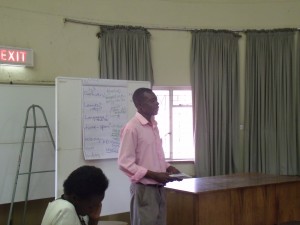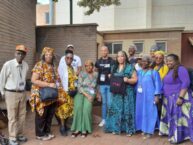
In this exclusive and wide-ranging interview with *MOSES MAGADZA, BEAVEN TAPURETA, a well-known Zimbabwean poet says, inter alia, that too many people all over the world continue to turn their noses at writers, perpetuating the mistaken belief that they are essentially unemployed people. He says far from being part of the lumpen proletariat, writers are full-time workers and unless and until they are regarded as such, their rights would continue to be violated. Tapureta is the founding Director of Win Zimbabwe, an organisation that networks Zimbabwean writers through the internet and through workshops and readings. He was one of the key staffers at Budding Writers Association of Zimbabwe (BWAZ) when it folded a decade ago. Tapureta is a trained journalist.
Moses Magadza: You have been one of the longest serving officers at Budding Writers of Zimbabwe (BWAZ). What would you put down as its major achievements?
Beaven Tapureta: BWAZ was like an academy where some writers of my generation were initiated into the real world of writing. It is no secret that some of my friends who are now recognised as poets or fiction writers passed through BWAZ and I think that’s one of its achievements. It confirmed our passions as new writers. There is Lawrence Hoba, now a published writer, Tinashe Muchuri, an established poet and journalist, Mbizo Chirasha, a renowned performance poet, Tinashe Mushakavanhu, now an editor, critic, and academic, others and myself who are products of BWAZ one way or another. There is this generation of us now doing different things but in the same literary arena.
Moses Magadza: What were its short comings?
Beaven Tapureta: BWAZ started very well but its demise remains a mystery to me. From my own experience, BWAZ faced funding problems just like any donor-funded organization. While some organisations like Zimbabwe Women Writers had at least produced anthologies from which they were earning royalties, BWAZ had none to sustain itself. BWAZ did not publish royalty-earning anthologies or books apart from the print magazine and the first journal on the burning land issue.
BWAZ seemed to be male-oriented despite it being led by a woman well-educated in matters of gender equality. Only a few female members are still writing today, the likes of Sympathy Sibanda and others.
Moses Magadza: Why did it fold when it did?
Beaven Tapurata: I left BWAZ in 2009 before it folded. I hatched the idea of forming WIN-Zimbabwe before even BWAZ closed and when it closed the way it did I had no idea what hit it. The problem BWAZ did when it folded was that it did not issue a public statement which would have helped its stakeholders, especially members, to figure out reasons for its abrupt dissolution. For instance, I have heard enquiries from former members of BWAZ about their manuscripts. No one even knows where BWAZ assets are. A public statement should have been produced for transparency.
Moses Magadza: You formed Win Zimbabwe to network all Zimbabwean writers at home and abroad. How feasible are your goals?

Beaven Tapurata: I am realizing that the international aspect of WIN Zimbabwe is opening up new forms of networking for published and unpublished writers in Zimbabwe and the diaspora. We have played the middle person in linking local unpublished writers with published Zimbabwean writers abroad or vice versa through our various platforms such as the blog. A conversation has been created at least and we hope that in the end, it’s the unpublished writer who must learn and benefit from the networking.
Emmanuel Sigauke is in USA but he is daily discussing literary issues with unpublished writers via our newly created WIN-Zim Whatsapp Group. Unpublished writers in South Africa or elsewhere abroad have connected themselves with what’s happening for them at home in the literary field through WIN Zimbabwe’s online platforms.
Not only have we connected with Zimbabwean writers at home and abroad but also with different literary organisations abroad.
Moses Magadza: Why did you form Win-Zim instead of going into formal employment? What is in it for you?
Beaven Tapurata: I worked at the National Arts Council of Zimbabwe when WIN was already in existent. I had a short stint at the Zimbojam before I got ‘swayed’ by some mighty hand to pursue full time the seed of my heart. I am content, I am happy with my job. It is a formal job despite it taking long to pay off.
But this is also where the problem is, that writers are not taken as workers in our country or Africa. Until Zimbabwe, or rather Africa begins to take its artists as workers, then shall we approach arts as a profession.
No wonder the disinterested position being taken by people and law agents in stopping daylight book piracy demonstrates the general lack of knowledge that writers are workers and that therefore they deserve what they earnestly earn.
I am sure this is where Dambudzo Marechera quarrelled with people; nobody took him as someone who had a serious job, a job he so much loved. I am in formal employment as it is, but society looks at it from a different point of view. The accepted thought is that no one survives on writing alone in Zimbabwe. We could start another debate on whether one can be a full-time writer or not in Zimbabwe. But we have Shimmer Chinodya, for example, who is a successful full-time writer.
Moses Magadza: Is it true that Win Zim is another BWAZ minus the leadership of Dudziro Nhengu?
Beaven Tapureta: That’s totally not true. It would be unfair to someone who has started his own new project from scratch and passion. Nhengu led BWAZ to where she led it and I will lead WIN to where it is destined. May I candidly say some of WIN Zimbabwe members were once with BWAZ. They were lost and confused when BWAZ folded and I could not turn them away because their gifts belong to neither WIN nor BWAZ but to God. This membership composition does not however make WIN a shadow of BWAZ. I have always not wanted to engage in competition with the BWAZ aftermath or any other writers’ organization because I inherited nothing but skills and experience from my previous employment. Do you know that the now dead Zimbabwe Writers Union (ZIWU) somehow gave rise to the formation of BWAZ and ZWW but these organisations had different missions?
Or a simpler example, would we say ZWA is another ZIWU minus its former leadership? I don’t think so. ZIWU vanished due its own failures and ZWA has its own different mission although it seemingly operates on the same level that ZIWU did and has members who were once with the now defunct ZIWU.
Moses Magadza: What does the future hold for Win Zim? I see that Win zim blog was nominated for a NAMA twice?
Beaven Tapureta: The future is promising and we are determined to move on although we know challenges are always there along the way. We are optimistic we will push through.
Actually the blog was nominated this year at the 12th NAMA Awards. The blog, among other programmes or activities, has grown to be an inspiration to our members and on a larger scale, to all writers who can access it. We have utilized it to promote local literature and there have been good results.
We use the internet to promote development of our literature.
Moses Magadza: What are your views on the idea that young prize-winning authors of Zim simply chronicle the misdemeanours of Africa in a sell-out way?
Beaven Tapureta: ‘Chronicle’ and ‘sell-out’, to me, are frightening words when speaking about writers. Real writers do not chronicle but create. In a sense, they simply creatively raise the ‘banner’ of the misdemeanours high so that everyone can see and judge for themselves.
The ‘banner’ is seen from different angles by readers and it is normal that a book receives all sorts of commentaries and criticisms.
A book on serious issues affecting Africa published outside the author’s country, widely reviewed outside, and probably awarded outside Africa, runs the risk of being labelled sell-out literature. Yet Africans should be critical readers of their own literature but if these internationally appreciated books by African writers are not available to the majority of the people to whom they must appeal then we also run the risk of judging the book by its internet cover.
Moses Magadza: What are your views on the new Ministry of Sport, Arts and Culture in Zimbabwe?
Beaven Tapureta: It’s a positive move. It was long overdue. I hope the new Ministry engages the book sector and other related sectors so that the arts and culture are not reduced to ‘the music industry’. I am saying music alone does not make the arts and culture. The Ministry should promote balance.
Government, through the Ministry, should increase support to the National Arts Council of Zimbabwe which should then complement the Culture Fund of Zimbabwe in supporting the arts and culture sector. National Arts Council should be granted capacity to fund arts and culture sector like they once did with the Artists Development Fund.
Moses Magadza: What are your views on the idea that ZIBF is stagnant and needs a young leadership?
Beaven Tapureta: While I agree with the freedom of opinion of those who think young leadership at ZIBF is the way forward, I disagree with them if they think bringing young people in ZIBF solves all. The issue is about funding. Age is not the matter here. Does it mean that if WIN starts under-performing due to lack of funds it means then that WIN should look for an old person to replace me? The idea of proposing a young leadership for ZIBF is simply a matter of hair-splitting. The real issue is about funding. ZIBF has had various directors and each drove ZIBF according resources available.
Moses Magadza: How would you reframe ZIBF?
Beaven Tapureta: In terms of structure, I would say, as an international book fair, it must have international branch offices, so that Zimbabwean writers and publishers are assured of representation abroad. I know this could be a far-fetched dream but it is achievable.
On the other hand, such a big organisation ought to have departmental offices at its Headquarters. Thus should funds permit, for instance, I would agree with some who have suggested that ZIBF needs a PR , Accounts, Information Technology, Marketing Departments and so forth…but these divisions of labour have to be few to avoid a cumbersome staff.
Moses Magadza: What do you think has been the relationships between Zimbabwean writers and the governing ZANU PF and their relationship with the opposition Movement for Democratic Change (MDC)?
Beaven Tapureta: I don’t know for sure. Writers, like other artists, are citizens and I think it is a personal phenomenon whether one is related or totally not related to any political party in Zimbabwe.
Moses Magadza: What is your evaluation of current writers’ organisation in Zimbabwe at the moment?
Beaven Tapureta: The existent writers’ organisations are working so hard but there’s not enough funding going towards them. If our reading culture is to improve there’s need to support existent organisations which are closely connected with communities.
Zimbabwe Women Writers has done so well in promoting women voices, Zimbabwe Writers Association is also playing its part. We are playing ours. The non-academic writers (ZANA) are moving on. There are other writers’ organisations looming up and hopefully we all contribute to the growth of our literature.
Moses Magadza: What are your views on Zimbabwean literature and the land reform?
Beaven Tapureta: Zimbabwean literature has always deified the land; you can read (Chenjerai) Hove, (Charles) Mungoshi and others whose novels are sometimes set in the rural area where the relationship between man and his land is more defined. But regarding the land reform that was done by the government I must say our literature took a nosedive on the land issue as the issue became a political conflict between Zimbabwe and Britain. The artist’s failure to objectively write about the fast-track land reform issue at the time when it happened may have largely been caused by the burning politics surrounding it and therefore writers were possibly faced with the age-old question about the role of the artist in politics.
However, there is published literature about the land reform from different perspectives. For instance, The Trek and Other Stories by Lawrence Hoba and before that, BWAZ published an epistolary journal called Exploding Myths about Zimbabwe’s Land Issue: The Budding Writers’ Perspectives in 2004.
It could be true that writers wouldn’t want to record history in a journalistic or propagandist way; they are probably still thinking how creatively they can write about it.
*Winner of the SADC Media Award (2008) and nine other awards, Moses Magadza is a Zimbabwean journalist and editor. He is broadening his mind in the School of Postgraduate Studies at the University of Namibia.






1 comment for “Poet says writers are full-time workers”